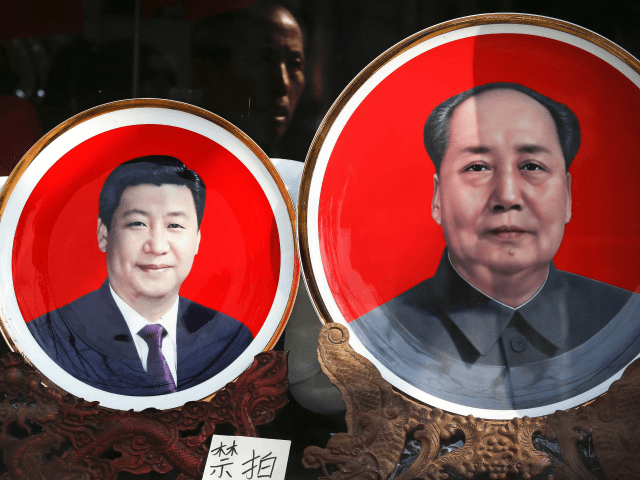Chinese Communist ruler Xi Jinping claimed the office of the presidency a second time on Sunday, beginning a term in office that, with term limits on the office repealed, could be the second of an unlimited number in the future.
Xi also serves as the head of the Communist Party and commander-in-chief of the People’s Liberation Army, a “trinity” of offices that Chinese state media insists is necessary to keep in the hands of one person.
In addition to assuming the office of the presidency, Xi took an oath of allegiance to the Chinese constitution, the first such act in the history of China. Following this month’s National People’s Congress, Xi’s name is part of that Chinese constitution, in which legislators enshrined his governing philosophy, “Xi Jinping Thought on Socialism with Chinese Characteristics for a New Era.”
The Global Times, a Chinese government newspaper, reported that various government media outlets praised Xi as “helmsman of the country” and “guide of the people,” celebrating at least another five years of his rule. The Times claimed in its headline that his re-election—by a small circle of Chinese regime elites, not by popular vote—was “supported by [the] whole nation”
Citing the People’s Daily, the official newspaper of the Communist Party, the newspaper declared: “Practices have proved that Xi is the pathfinder of socialism with Chinese characteristics for a new era and the navigator in achieving the great dream of national rejuvenation.”
“He is no doubt the lingxiu, or leader, who is supported by the whole Party and loved by the people,” the People’s Daily reportedly declared.
Lingxiu roughly translates to “leader,” but invokes the rule of Mao Zedong, when the title was more commonly used. Xi would be the first Chinese leader since Deng Xiaoping to be commonly referred to as lingxiu.
“Usually lingxiu has broad meaning and refers to several people at the highest level. But in the current circumstances, it has specific meaning which may endow Mr. Xi a role equivalent to Deng and Mao,” political analyst Roger Woo told the Hindu, according to the Guardian.
The People’s Daily referred to Xi as lingxiu for the first time in January, as well, in a column urging Chinese people to do away with any public displays of dissent or criticism and “faithfully follow the lingxiu, use our courage and morale … and make strides toward a brighter future.”
The Global Times explained that month, quoting a Chinese Communist Party professor, “The word lingxiu means more than just a leader. It is often bestowed to a leader who enjoys the highest prestige, who is the most capable and who is widely recognized by the entire Party.”
Xinhua, a Chinese government newswire service, celebrated the beginning of Xi’s second term with effusive praise, deeming him the “chief architect” of reforms that have made China increasingly repressive yet influential through programs such as the installation of “Confucius Institutes” in foreign universities and “One Belt, One Road,” a global infrastructure project that would grant China near-total control of world transport.
“He is regarded as the chief architect,” Xinhua proclaims. “In the five years, more than 1,500 reform measures were issued, affecting economic, political, social, cultural, environmental fields, national defense and Party building. Government red tape was cut. Foreign investment was made easier.”
“Xi has said happiness comes out of arduous work,” the news service continues, in an article that features several photos of what appears to be Xi engaging local residents in rural and underdeveloped areas of China.
Xinhua reported that “thunderous applause reverberated in the Great Hall of the People” when the National People’s Congress re-elected Xi unanimously. Yet cracks have begun to appear in Xi’s public approval, indicated by the government’s growing efforts to silence dissent. When Chinese officials first announced that they would repeal term limits to allow Xi to remain in power forever, Chinese internet censors shut down anything that even distantly seemed like dissent, resulting in Chinese social media outlets blocking searches for phrases like “I don’t agree” and the letter N, which some dissenters had begun to use to criticize Xi.

COMMENTS
Please let us know if you're having issues with commenting.